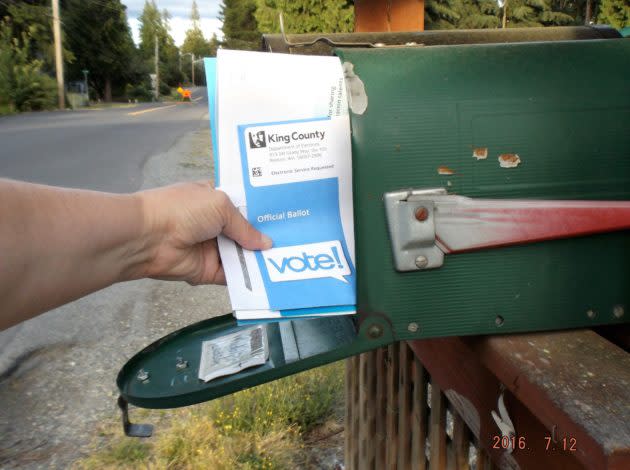How state election officials guard against rigging (or hacking) the vote

It’s finally come to this: Ballots for the general election are in the mail, and within days, Washington state voters can register their choice for president.
But how do you know the vote won’t be rigged, or ruined by Russian hackers?
It’s prudent to be concerned, but the state official in charge of the election process says it’s “irresponsible” to make baseless accusations about the integrity of the voting process.
“I have full and complete confidence in our system,” Washington Secretary of State Kim Wyman, a Republican who’s up for re-election this year, said in a blog posting this week. “Every eligible ballot will be handled securely and will be tabulated carefully and accurately.”
Washington politicians and voters had an up-close look at the chinks in the voting system back in 2004, during one of the closest state-level elections in history. Back then, Democrat Christine Gregoire prevailed over Republican Dino Rossi by a mere 129 votes, out of 2.8 million votes cast.
During months of legal wrangling, lawyers turned up evidence for more than 1,600 illegal votes – including 1,392 ballots from felons who lost their voting rights, 252 provisional ballots that were mishandled, six cases of double voting, and 19 cases where ballots had been cast for recently deceased voters.
Despite those problems, the courts ruled that the outcome should stand, because there was no way to determine whether the illegal votes made a difference.
Since then, much has changed. For one thing, Washington has gone to a total vote-by-mail system. “We don’t have polling places where a lot of those ID issues are raised,” said David Ammons, a spokesman for the secretary of state’s office.
Also, a statewide database is now in place to block illegal votes, thanks in part to federal funding. The database compares voter registration records with criminal records from courts and the Department of Corrections, data from the Department of Licensing and vital records from county auditors, the Department of Health and the Social Security Administration.
Wyman wants to see one more piece added to the voter ID puzzle: a requirement to provide proof of citizenship in order to get a driver’s license. That “REAL ID” provision is likely to come up for action in the Legislature next year.
Washington’s voter rolls are also cross-checked on an anonymized basis through a 21-state consortium known as the Electronic Registration Information Center, or ERIC.
Are you registered? There’s a website to help you find that out. And if you’re not, you can still sign up by showing up in person at a county election office by Oct. 31.
So what happens once you send in your vote? Starting next week, workers at county election offices will be matching up ballots with the signatures they have on file for verification. “We’re still doing it the human eyeball way,” Ammons told GeekWire.
Hundreds of temporary workers will be brought in to do the job in King County alone. And the job won’t be done on Election Night, Nov. 8. Ammons estimated that 50 to 60 percent of the vote would be reported, with the final results to be reported once all the ballots are received, checked and collated.
In this week’s update, Wyman noted that the paper-based system creates an audit trail. “Our state registration system remains cybersecure, and our tabulation systems in the counties are air-gapped and not connected to the Internet,” she said.
Ammons said the state election administration system got an outside review under the terms of a contract with the federal Department of Homeland Security. “They found a couple of minor things, essentially to strengthen our firewall,” he said.
There are a few ways to monitor the vote: You can track your ballot’s progress through the system by plugging your name and birth date into an online “Ballot Tracker” that’s offered by King County and many other counties. Political parties will have trained observers watching as ballots are processed, and King County will provide live video when processing is under way.
If you don’t receive your ballot, or if you encounter a problem with the voting process, contact your local election office.
And if you’re waiting to vote over the Internet, don’t hold your breath. Overseas and military service members have limited capability to send in ballots via email, but Ammons doesn’t expect voting to go online anytime soon.
“We’re waiting until it’s hack-proof and secure,” he said.
More from GeekWire:
Democracy Live launches digital replica ballots for voters across the U.S.
Live blog: Track the triumphs and tribulations of Election Day tech
Startup Spotlight: Democracy Live uses electronic ballots to help governments reach voters
Election hacking hype: A reality check from an information security specialist
